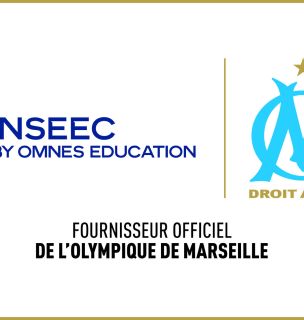Why choose the MSc Human Resources Manager training ?
In a particularly complex globalization environment, Human Resources are reinventing themselves to strengthen their role within the company, to be a real performance lever and thus fully participate in the creation of new values. The MSc Manager of Human Resources insists as much on acquiring new concepts and digital tools for HRM as on the student’s ability to understand the nature and evolution of social relations in the company by 2025 and to know how to integrate into it.
It is a demanding training that addresses all aspects related to the HR of tomorrow and forms operational profiles, as soon as they arrive at the company.
Whatever their size, the human capital of companies is a means to increase their capacity for innovation, competitiveness and responsiveness. To develop this capital and make the most of it, the HR function must become a strategic business partner for the company leader.
In fact, the program has constantly evolved and now integrates both the classical disciplines and know-how essential to human resources, as well as innovative practices, to face the major changes that are redefining the work environment, the workforce and the work itself.
Training objectives
The human resources manager’s mission is to define the organization’s human resources strategy and then, in coordination with general management, to pilot it and monitor its implementation in the short, medium, and long term with a team he/she leads.
For this, he/she is responsible for the administration, management and development of staff (recruitment, training, career management as well as salary policy). He/she is also responsible for consultation and social dialogue with staff members and/or their representatives. He/she monitors the proper application of legal and regulatory obligations. All these missions are carried out in a perspective of inclusion and in the broader respect of CSR principles.
The certification aims to train human resources managers rooted in the realities of the field, with an excellent ability for analysis and hindsight, a mastery of the fundamentals in law and CSR. They must also be able to manage teams at a local level, scattered across the national territory or within international subsidiaries.
Discover our MSc in Human Resources Management

A degree in 1 or 2 years to become an expert in human resources
This training is available in French or 100% English, depending on the campus.
- Hourly volume 1st year of MSc: 441 hours
- Hourly volume 2nd year of MSc: 441 hours
How to apply for the MSc in Human Resources Management at INSEEC ?
The prerequisites required
The prerequisites required to access the certification program (excluding VAE) are as follows:
- For an entry into the 1st year of the course (MSc 1): Be holder of 180 ECTS (level 6 or equivalent) in the field of human resources, management sciences, social sciences, humanities or economics.
- For entry into the 2nd year of the course (MSc2): Hold 240 ECTS (level 6 or equivalent) validated in the field of human resources or, as appropriate, in a program such as Economic and Social Administration (AES), social law or humanities, psychology, sociology.
The institution remains open to candidates from other fields of study as long as their professional project aligns coherently with their aspirations.
Would you like to know more about the MSc Human Resources Manager program?
Sign up for an Open Day!
Would you like to learn more about the admission requirements for our MSc in Human Resources Management program?
What are the courses of the Master of Science in Human Resources Management ?
The courses listed below are examples only and may vary slightly depending on the campus. The content of the courses is adapted each year to market developments and is updated before the start of each new school year.
1st year courses
TRANSVERSAL & FUNDAMENTAL COURSES – 1ST YEAR
BUDGET MANAGEMENT & DASHBOARDS
- The objective is to acquire key skills in terms of budget management and reporting.
- Particular emphasis will be placed on the budget architecture, with the implementation of summary documents, project management control and its link with budget management, the execution and management of dashboards.
SOFTWARE & DECISION-MAKING TOOLS
- This module aims to deepen the students’ computer skills to meet the demand of companies in terms of budget or commercial monitoring, project management, personnel management and communication: Excel, Word, PowerPoint, team work tools, business software.
- It aims to be efficient with office tools, quickly identify and correct errors, customize existing tools or create your own tools.
NEGOTIATION APPLIED TO HR
- The skills necessary for good HR negotiation include communication, listening ability, empathy, managing emotions, the ability to find compromises and maintain positive professional relationships.
- The overall objective of negotiation in HR is to reach agreements that benefit both the organization and its employees, while ensuring a stable and respectful work climate.
TOOLS & PROFESSIONAL METHODS
- Resume writing, recruitment interview techniques for internship search, professional project management, team management and meeting conduct.
- Negotiation techniques, transactional analysis and NLP, speaking out and managing stage fright, management techniques and leadership.
- Skills assessment, coaching, digitalization of the CV and job search techniques at national and international level, preparation for the defense of the applied research thesis.
CORPORATE STRATEGY & BUSINESS PLAN
- This module aims to learn how to create a Business Plan or business plan: costed project design for business creation or development.
- Several steps are addressed: feasibility study, market targeting, opportunities and risks, strengths and weaknesses, communication, financing plan and profitability.
SPECIALIZED COURSES
INTERNAL COMMUNICATION
- The company in its relationship to man.
- Internal communication as a management tool.
- The corporate project.
- Corporate culture and rites.
- The objectives of internal communication and the tools available.
- Development of the internal communication plan.
- Proximity management, hierarchical line and communicational implications.
INDIVIDUAL & COLLECTIVE BEHAVIORS IN THE COMPANY
- Personality, identity and behaviors.
- The social bond and socialization.
- Hierarchy, domination and power.
- Culture and social representations.
- The dynamics of groups.
DIGITALIZING HR
- Presentation of HRMS (Human Resources Management Information System) tools, their objectives and their use.
- Description of data issues and awareness of the GDPR framework.
SOCIAL LAW
- Understand the structure of social, individual and collective relationships.
- Know and apply through the resolution of case studies, the reasoning of labor law, the different legislative, regulatory, and jurisprudential developments.
LABOUR LAW
- The different types of employment contracts.
- Prerogatives of the employer.
- The breach of the employment contract.
- Protected categories, discrimination, equal treatment.
GREEN MANAGEMENT & SUSTAINABLE DEVELOPMENT
- Green Management is one of the essential levers for achieving sustainable development objectives in companies.
- By integrating sustainable management practices, companies contribute not only to the preservation of the environment but also participate in a fairer and more equitable economy for all.
MANAGEMENT & LEADERSHIP
- Train professionals capable of leading and managing teams and organizations.
- Acquire the skills and knowledge to lead and manage men and women.
- Develop leadership qualities, including vision, motivation, and communication.
- Adapt to changes in the world of work.
HR MASTERCLASS
- Masterclasses applied to HR are implemented throughout the year in order to introduce the latest developments and trends in recruitment, retention, team animation, etc.
REMUNERATION POLICY & PAY SLIP
- Components of remuneration.
- Understanding the logic of a payslip.
- Preparation of a pay slip.
- Themes related to employee and employer contributions for social protection and unemployment.
- Supplementary schemes.
SOCIAL POLICY & INNOVATION
- Reduce inequalities and promote the well-being of individuals, focusing on access to services and equal opportunities.
- Translates into actions on working conditions and diversity management.
- Social innovation involves adapting to demographic and technological changes through new solutions for sustainable performance.
PSYCHOLOGY OF WORK & ORGANIZATIONS
- The factors that influence the success of a work team.
- Adaptation to change and professional development: the brakes and psychological springs.
- Managing stress at work and burnout.
- The effects of information and communication technologies on work and organization.
ORGANIZATIONAL SPECIFICITIES & HUMAN RESOURCES MANAGEMENT
- The difficulties of the organization in terms of human relations.
- The organizational system and its elements.
- The major theoretical approaches to organization.
- Different types of organizations.
RECRUITMENT TECHNIQUES
- Selection of candidates and integration into the company.
- Place of recruitment and GPE in the HR strategy of the General Management.
- Recruitment tests, graphology.
- Typology of the tests most used by recruiters: logic and comprehension tests, personality tests, job simulation tests.
TA PROMPT ENGINEERING
- Introduction to the fundamentals of interaction with generative artificial intelligences such as ChatGPT, DALL-E and other LLM models.
- Learn how to write and optimize effective prompts to fully exploit the potential of these tools in various contexts, such as content creation, productivity, and automation.
- This module also addresses the ethical issues, limits and biases of AI in order to promote responsible use.
- Through practical exercises and concrete cases, this course provides a solid foundation to deepen the skills in generative artificial intelligence.
EXAMS & SUPPORT
WRITTEN EXAMS
The 2nd year courses
HUMAN RESOURCES STRATEGY
HR STRATEGY & SOCIAL AUDIT
- Effectively manage human resources and acquire a strategic and operational vision of the HR function.
- Understand the role and missions of HRD to lead and support company changes.
- Know the logics of organization and their consequences at the level of management and HR management.
- Integrate corporate social responsibility (CSR) into human resources policy.
MANAGEMENT OF THE EMPLOYER BRAND
- Définition et enjeux de la marque employeur : comprendre ce qu’est la marque employeur, ses enjeux et ses objectifs.
- Diagnostic de la marque employeur : analyser l’image de l’entreprise en tant qu’employeur, auprès des candidats et des collaborateurs.
- Stratégie de marque employeur : définir les objectifs et les actions à mener pour améliorer la marque employeur.
- Communication et déploiement de la marque employeur : mettre en œuvre les actions de communication et de déploiement de la marque employeur.
CSR, DIVERSITY & ETHICS
- The objective of this module is to understand the concepts of Corporate Social Responsibility and to be able to integrate them into a Human Resources Management policy.
- The identification of HR indicators for extra-financial reporting is also presented.
METHODOLOGY OF THE APPLIED RESEARCH DISSERTATION
- The applied research thesis aims to develop analytical and reflection skills around a managerial question.
- It is an opportunity to demonstrate its rigor in the analysis of a problem or managerial issue and the formulation of operational recommendations.
- The research thesis reflects the research work and is structured into three main stages: a review of the literature, qualitative and/or quantitative results, and managerial recommendations.
SKILLS & QVCT
MANAGEMENT OF JOBS & PROFESSIONAL PATHS
- The objective is to understand the GEPP strategy in an organization and the role of GRH in the GPEC project.
- The learner will be able to understand the different operational actions of HRM in a GEPP project, to know the actors involved in the process as well as the obligations of the organization.
- The legal aspect is also addressed in order to know the laws, tools of mobility for an effective GEPP and to Translate the project into concrete and operational actions.
TRAINING POLICY & ENGINEERING
- Acquire the skills and knowledge to design, implement and evaluate training policies and systems.
- Develop a strategic vision of training.
- Adapt to changes in the world of work.
- Understand the interest of training in the career development of employees and as a driver of innovation and motivation in the company.
- Master the legal and political context of training and the obligations of the training plan.
- Analyse and implement the reform of continuing vocational training.
CROSS CULTURAL HUMAN RESOURCES MANAGEMENT
- The objective is to discover and put into action human resources management at an intercultural level.
- How to manage a multicultural team?
- What are the best practices?
TALENT MANAGEMENT
- Talent management is an essential strategic lever for any organization wishing to succeed in the long term.
- By attracting, developing and retaining the right talent, the company ensures an engaged, skilled workforce ready to face future challenges.
- Effective talent management is thus a key factor for success in an ever-changing economic environment.
RECRUITMENT, REMUNERATION & PAYROLL
MANAGEMENT & PERFORMANCE MPMO
- Give meaning to the teams regarding the company’s strategy.
- Develop a remuneration policy consistent with the skills of the employees and with the company’s turnover.
- Improve the recruitment experience of candidates.
- Leverage employee data to support the strategy, while respecting the challenges of the GDPR.
- Manage the employer brand and thus support the business image.
COMPENSATION POLICY & PAYROLL MANAGEMENT
- Development and definition of a remuneration policy.
- Components of remuneration and wage scale.
- Qualification and individualization of remuneration.
- Profit-sharing, participation and employee savings.
- Control of the payroll.
- Computer science applied to HR.
- Introduction to the fundamentals of interaction with generative artificial intelligences such as ChatGPT, DALL-E and other LLM models.
- Learn how to write and optimize effective prompts to fully exploit the potential of these tools in various contexts, such as content creation, productivity, and automation.
- This module also addresses the ethical issues, limits and biases of AI in order to promote responsible use.
- Through practical exercises and concrete cases, this course provides a solid foundation to deepen the skills in generative artificial intelligence.
SOCIAL LAW & EUROPEAN LAW
- Use and manage human resources while respecting labor law.
- Find your way in the hierarchy of texts: European law, constitution and treaties, laws and regulations, conventions and collective agreements, internal rules and labour code.
RISK PREVENTION & CRISIS MANAGEMENT
PSYCHOSOCIAL RISKS & STRESS MANAGEMENT
- Analysis of health conditions and failures in a work situation.
- Work, fear, suffering and illness.
- Methodology of observation and interpretation.
- Stress and burnout.
- Stress management at the individual level.
MANAGEMENT OF RELATIONS WITH THE SOCIAL PARTNERS
- The management of relations with social partners is a key function in maintaining harmony within the company.
- It requires active listening, effective communication, and a willingness to negotiate balanced solutions for all parties.
- By promoting a collaborative and transparent approach, companies can not only avoid conflicts, but also create a more productive and satisfying work environment for employees.
MANAGEMENT & MEDIATION OF SOCIAL RELATIONS
- The management and mediation of social relations are essential for creating a harmonious and productive work environment.
- They allow not only to resolve conflicts peacefully, but also to prevent their emergence through open dialogue and proactive management of tensions.
- By investing in this approach, companies not only promote their internal well-being, but also their sustainability and long-term performance.
CHANGE MANAGEMENT & RESTRUCTURING MANAGEMENT
- Establish a socio-organizational diagnosis of companies.
- Analyze the strategies related to change behaviors.
- Evaluate the changes in representations and the assessments of the issues of the different actors.
- Identify resistance to change and promote the involvement of stakeholders.
- Master restructuring mechanisms and legal obligations.
- Negotiate with the main interlocutors.
- Carry out restructuring or redundancy plans under the best conditions.
COMMUNICATION STRATEGY & CRISIS MANAGEMENT
- Definition of a crisis.
- Preparation and anticipation of a crisis.
- Methodology for diagnosing and managing a crisis.
- Crisis communication and media training.
- Knowledge of the media environment.
- Implementation of public relations.
EMPLOYEE MANAGEMENT & HR REPORTING OVERSIGHT
COMPUTERIZED MANAGEMENT TOOLS APPLIED TO HR
- Create dashboards on the company’s commercial activity: sales, orders, supplier relationships, business prospecting, by sector, by amount / currency, by dates.
- Communicate information to different interlocutors, using the appropriate media: PowerPoint communication, communication with Word, creation of video support (notably for the creation of tutorials during the implementation of a new tool, a new application, a new business process).
- Software (Excel, Word, VBA, professional software).
MANAGEMENT CONTROL & HR PERFORMANCE INDICATORS
- Budget management.
- Construction of social dashboards.
- Workforce management, social audit, recruitment, training, remuneration.
- Forecast management of the payroll: development of a management model in Excel.
TOOLS & PROFESSIONAL METHODS
- The use of professional tools and methods in project management, human resources, social relations, and decision-making is essential for improving organizational performance, create a harmonious work environment and make informed decisions.
- These tools help to structure processes, solve problems, facilitate communication and ensure that the company evolves effectively and consistently in its strategic objectives.
MANAGEMENT & LEADERSHIP
- Management and leadership are two essential skills to ensure the success of an organization.
- While management focuses on efficiency and control, leadership is interested in inspiration and human impact.
- The best managers are often also leaders, and great leaders have management skills.
EXAMS & SUPPORT
EXAMS
- Written exams
- Thesis defense
What are the beginnings and study schedules ?
Two intakes per year are organized, in February/March and September/October. To check the opening of each intake, contact the admissions department directly.
The pace of courses can differ depending on the campus and whether the training is carried out under an internship agreement (initial) or a professionalization/learning contract (continuous).
The work-study contract must be signed for a period of 12 months (MSc2) or 24 months (MSc1 + MSc2).
To find out the duration of the contract during the delayed start period, contact the campus admissions service that interests you directly.

What are the career prospects after completing an MSc in Human Resources Management ?
The HR function, traditionally seen as an administrative expert, has been committed for many years to digitalizing processes such as payroll and recruitment. However, organizations of all sizes (startups, small and medium enterprises, large corporations) now expect HR to evolve into a true change facilitator for the company and a “business partner” to the top management.
HR directors tell us they are facing a challenge: initiating transformation today to attract talent, promote cross-functional collaboration, manage new work arrangements, and enhance employer branding while continuing their operational functions.
Indeed, this shift requires specialized profiles in change management capable of driving talent development, identifying/recruiting profiles that are adaptable to the jobs of tomorrow (influenced by the digitalization of roles), and championing the new social promise (quality of work life, candidate experience, employer brand), all while ensuring the company’s commitments (compensation and benefits, performance, labor law).
The achievable careers after this training include:
- Human Resources Director
- Human Resources Manager
- Human Resources Manager
- HR Development Manager
- HR Officer
- Recruitment Manager
- Training Manager
- Disability Mission Officer
- Career Management Officer
The outsourcing of certain services also leads providers to offer positions requiring the skills of a Human Resources Manager:
- HR Consultant
- Recruitment Expert / Talent Manager
At the beginning of their career, human resources managers may hold positions as ‘human resources officers’ before moving into a managerial role with the supervision of a team.
To consult the detailed job descriptions by specialization.
What business skills are developed ?
Professional certification allows the preparation of the following blocks of skills :
- Define the human resources strategy and manage HR development
- Develop the skills of employees and promote quality of life and working conditions
- Manage recruitment, define the remuneration policy and supervise payroll management
- Design risk prevention policy and manage individual and/or collective crises
- Manage their employees and manage HR reporting.
Description of the modalities for acquiring certification through the capitalization of skill blocks and/or by correspondence
The certification is obtained by :
- The validation of five skill blocks common to all pathways (obtaining a score of 10/20 or higher in each skill block).
- Completion of a minimum 132-day internship during the second year of the program (MSc 2).
Professional certification
Professional certification of “Human Resources Manager” level 7 (EU), code NSF 315, issued by INSEEC MSc (CEE-SO, CEE-RA, CEE-OUEST, CEFAS, MBA INSTITUTE), registered under number 37748 in the RNCP (National Directory of Professional Certifications) on the decision of the General Director of France Compétences from 07/19/2023.
The certification is delivered by capitalization of all skill blocks. Each skill of a block must be confirmed to obtain the skills block. Partial validation of a block is not possible. It is also accessible by the way of the Validation of Acquired Experience.
Find the skills blocks associated with this RNCP title by clicking here.
What are the teaching methods for the MSc in Human Resources Management ?
Teaching methods
- Lectures or/and interactive courses
- Situational exercises through collective or/and individual case studies carried out by the students
- Conferences, seminars or/and educational visits
Evaluation methods
- Individual or/and group case studies
- Individual or/and group oral presentations
- Individual or/and group files
- Applied research thesis with individual oral presentation
Methods and tools
- The evaluation methods are face-to-face, in the form of continuous assessment or final exams in the form of mid-term exams.
What are the 2025/2026 tuition fees to join the training in MSc Human Resources Manager ?
FALL INTAKE – 2025
Initial training:
- MSc1: €10,990
- MSc2: €12,950
Apprenticeship program:
- 24 months : €23,400 before tax
- MSc2 : €13,490 before tax
International students pack
Mandatory fee of €700 for exclusive support services for international students living outside the European Union.
SPRING INTAKE – 2026
Initial training:
- MSc1: €10,990
- MSc2: €12,950
Apprenticeship program:
- 24 months : €23,400 before tax
- MSc2 : €13,490 before tax
International students pack
Mandatory fee of €700 for exclusive support services for international students living outside the European Union.
In the context of work-study training, tuition fees are payable by the OPCO and the company signing the contract.
Do you have any questions about work-study or our school in general ? Consult our frequently asked questions.
VAE/VAP
- VAE: €4,800 before tax
- VAP: €850 before tax
International students pack
Mandatory fee for exclusive support services for international students living outside the European Union.
- Fall intake (2025) – September/October: €700
- Spring intake (2026) – February/March: €700
Application fee
The application fee is €80.
What kind of financial help is available ?
INSEEC offers several financial aid schemes:
- The alternating rhythm, in internship or work-study contract
- The right to training via the CPF
- Banking partnerships
the key figures for RNCP n°37748 "Human Resources Manager"
97%
National success rate – Promo 2024
95%
Presentation rate
Promo 2024
84%
Overall insertion rate (185 respondents out of 422) – Promo 2023
77%
6-month satisfaction rate (185 out of 422 respondents) – Promo 2023
*The details are available on this document made available to you (national results and by regional certifier).
What is the Disability policy in our school ?
The OMNES Education Group pays particular attention to the societal environment, including the disability dimension. Indeed, we believe that students with disabilities should not have any problems in pursuing their studies and starting a professional career. We accompany them to facilitate their access to the premises, offer them personalized advice as well as adapted accommodations throughout their school career.
Accessibility of premises: all our campuses are accessible to people with disabilities.
To learn more about the OMNES Education Group’s disability policy, click here.
Contacts for disability referents by campus:
- Bordeaux : Maxime DOUENS – mdouens@inseec.com
- Lyon : Anissa GASMI – agasmi@inseec.com
- Rennes : Laura LE CALVEZ – llecalvez@omneseducation.com
- Paris : Farid HAMAD – fhamad@inseec.com
- Chambéry : Marianne FERLAY – mferlay@inseec-edu.com
- Marseille : Océane VALOTTI – ovalotti@omneseducation.com
- Toulouse : Amanda MARNEIX – amarneix@omneseducation.com
News

June 2024
INSEEC hosted the CFNews Grands Prix de la Croissance Externe Sud Ouest for the second year running
Read more





